My father, the Catholic priest who doesn't want to know me
- Published
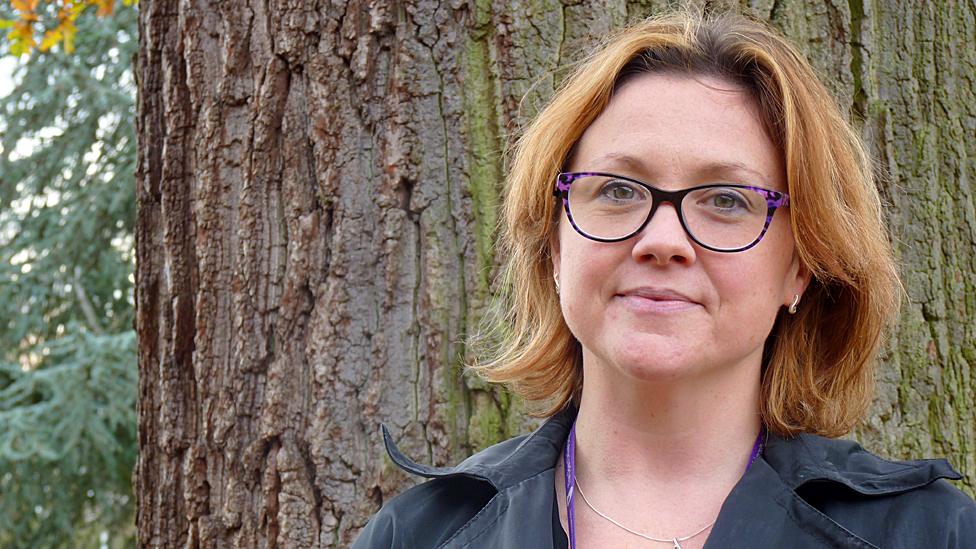
At the age of 12, Sarah Thomas found out that her father - who she'd never known - was a Roman Catholic priest. She then spent years trying to establish a relationship with him. It took a near-death experience for her to overcome the scars of his rejection.
Sarah Thomas was brought up by her mother in a housing association flat with a flower-filled balcony on an estate in south-east London. Although they were hard-up, Sarah remembers it as a happy childhood, punctuated by birthdays, Christmases and church on Sundays.
But as she grew older Sarah began to notice that her family was different. Everyone else she knew spent time with their fathers even if their parents were divorced, so why didn't she? She didn't even know who her father was.
Her mother eventually told Sarah that he was a university lecturer.
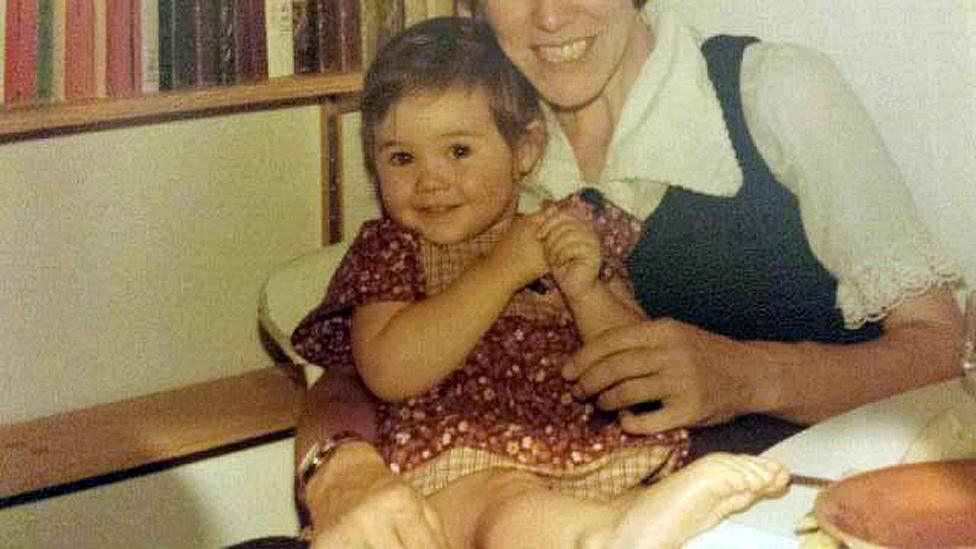
Sarah Thomas aged one-and-a-half
"But I just had a feeling that there was something I wasn't being told. Why was it all such a big secret?" Sarah says.
In 1990, when Sarah was 12, her mother finally told her the truth. Her father wasn't a lecturer - he was a Roman Catholic priest, living and working in London.
"I just said, 'That's fantastic! I'm sure he'd like to meet me,'" Sarah says.
Her mother wasn't so sure.
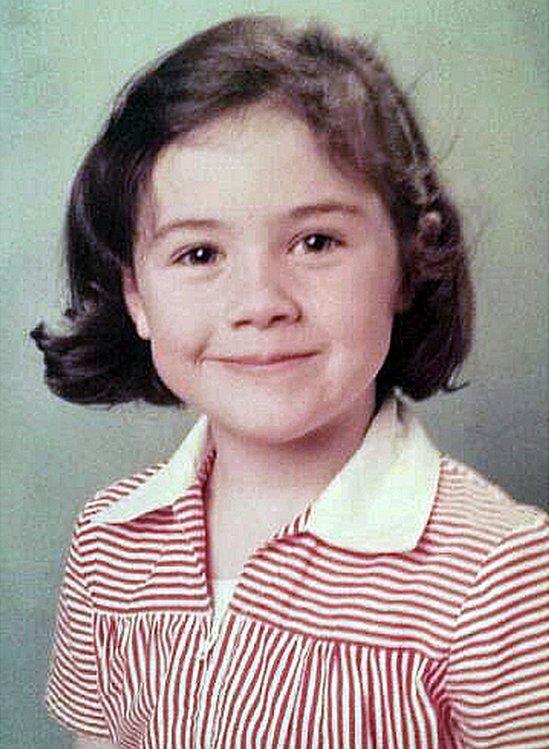
Sarah's parents met while they were both mature students in 1970s London. They had been together for about two years when, at the age of 34, Sarah's mother fell pregnant.
"She was definitely in love with him and she thought he loved her," Sarah says.
Her mother hoped that her lover would give up his studies and marry her. She was living in a student flat with two friends who were also dating trainee priests, and at least one of the men had decided love took priority over the priesthood.
But Sarah's father was horrified when he found out about the pregnancy. He ended the relationship that day and never spoke to Sarah's mother again on his own - only in the presence of another representative of the church.
A senior priest suggested to Sarah's mother that she go away to stay by the sea until the baby arrived and then give it up for adoption, but Sarah's mother refused.
How the daughter of a priest in the UK discovered the truth about her father
"So this priest decided that my father could carry on and become a priest," Sarah says, "as long as my mother and the child - me - were in cahoots with their plan of secrecy."
This is why Sarah was told nothing about her father as she was growing up. Later Sarah learned that he had occasionally sent her mother money.
"But the money was often accompanied by letters reinforcing the need for secrecy, saying things like, 'If you ever talk about this or identify him as the father then the money will stop.'"
Once Sarah had expressed a wish to meet her father, though, her mother started writing to him to persuade him to agree. And two years later, he did.
"In my naivety, from watching chat shows where people who haven't ever met run towards each other and start crying and then they're friends for ever and ever - that's how my friends and I had thought it would be," Sarah remembers.
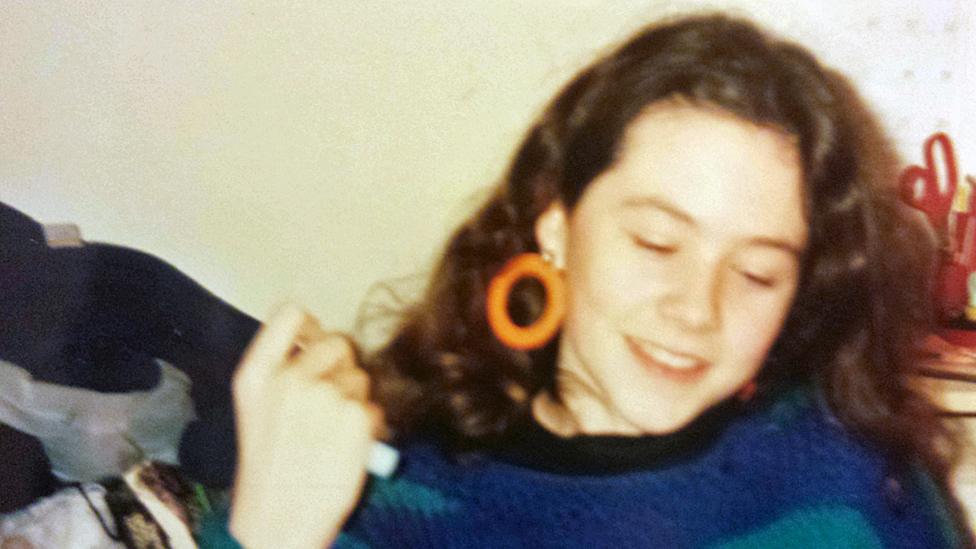
Sarah, pictured around the time she first met her father
She was excited about the meeting and wore her favourite turquoise and white tie-dye jeans from Camden Market.
"I will always remember them," she says, "I felt so awkward, I spent a lot of time in the meeting just looking at my knees."
Her father had brought a Catholic counsellor with him and Sarah, who was by now 14, was accompanied by the husband of one of her school teachers, an arrangement that completely failed to put her at ease.
"I'd grown up without a father-figure in my life so I wasn't that comfortable with men and I didn't really know how to react to them," Sarah says. "I could hardly speak due to nerves, all the questions I'd been planning to ask evaporated."
She remembers her father's eyes, which remained fixed on her throughout the meeting, his casual clothes which didn't look at all priestly, his short grey hair.
"I went in there thinking we were going to be best friends, but he was very aloof and cold," she remembers.
The last thing Sarah's father said to her that day was that he wouldn't be able to see her again for four years.
"Before we'd met I'd thought, 'Well, of course, he'll love me,'" she says. "So when he did meet me and the outcome was that we still weren't going to have any kind of relationship, that really hurt."

Where to get help
Coping International, external is an organisation that promotes the well-being of children of Catholic Priests and their parents. It can offer support and advice if you have been affected by the issues raised here.

Looking back, Sarah sees that first meeting with her father as a turning point in her life.
She stopped trying hard at school and remembers bursting into tears at inappropriate moments.
Her diary entries from the time are angry and unhappy.
"There was always something at the back of my mind, telling me I was worthless," she says.
After sixth form, Sarah enrolled on a foundation course at art college, moving into a shared house in south London with a group of friends.
She threw herself into partying, in the hope of making herself feel good and compensating for her low self-esteem. She lived in the moment and was unable to make plans for the future. Her clothes became baggy because she was eating so little.
Sarah saw her father a couple of times over the following years. He always insisted on meeting in a bar or hotel, far away from where he lived, while she tried hard to provoke a paternal reaction in him.
"I gave him books about family relationships," she says. "I even gave him an album of photos of me from when I was a baby until that age trying to say: 'Look! I'm your daughter, look at these pictures, they're cute.'"
But Sarah didn't get the response she craved.
"I just never felt good, I never felt loved and I never felt like I understood the situation," she says.
In early 1998, after a few particularly heavy days of clubbing, Sarah and a friend decided to use their student loans to fly to Tenerife on holiday.
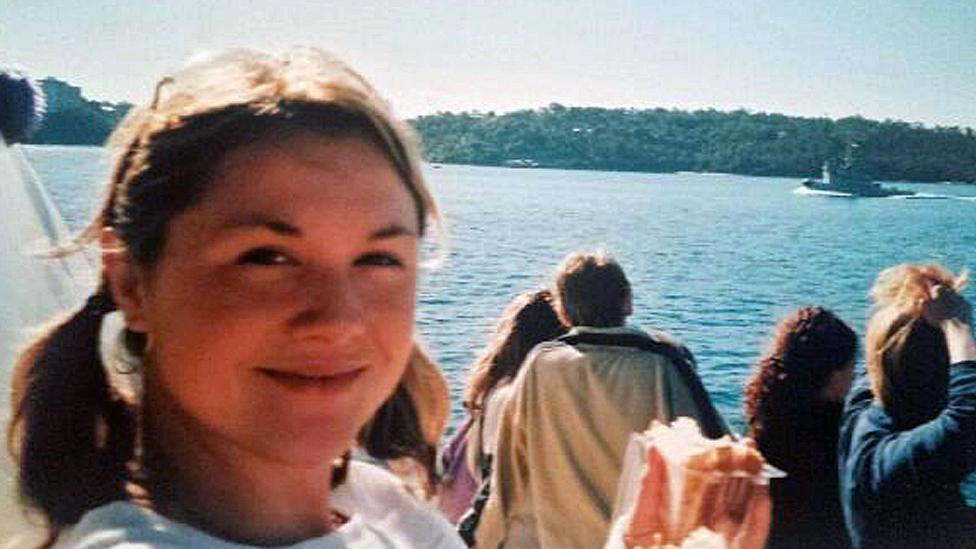
Sarah in 2002
"By this point I was very, very thin, I'd stopped looking after myself to such an extent that I just didn't eat anything during that holiday," she says.
One morning while trying to get back to their hotel after a night out, Sarah slipped from the edge of a mountain road, and fell a long way before landing on concrete.
She remembers the sirens, the stretcher being pushed under her body, something being fitted around her neck. But surprisingly she wasn't in any pain.
Instead she felt completely at peace, blissfully happy, uplifted.
"I was alive but away from my body," she says. "It was amazing, I couldn't ever remember feeling better."
She remembers feeling as though she was being drawn upwards out of her body and towards a soothing, bright light, but the experience was suddenly cut short when a doctor started shouting her name and hitting her hand.
"I tried to ignore her," Sarah says. "I knew I was dying and she was trying to bring me back."
The light disappeared, the wonderful feelings began to slip away and the pain kicked in. Sarah couldn't move most of her body and one of her arms was bending the wrong way.
The doctors telephoned Sarah's mother in London and told her to come as quickly as she could.
"Mum then phoned my father and said, 'Sarah might die, come over,'" Sarah says. "But he just said no."
The broken arm was the least of Sarah's injuries. She had three skull fractures, internal bleeding in her head, a collapsed lung and liver trauma.
After two weeks in hospital in the Canary Islands, she was transferred to a hospital in London.

Find out more
Sarah Thomas spoke to Hugh Costello as part of his documentary for the BBC World Service's Heart and Soul programme
You can listen to Heart and Soul: My Father the Priest on the BBC iPlayer

But although she came close to death and spent months recovering from her injuries, Sarah says the accident was the best thing that could have happened to her.
It was another turning point.
"I've got a before-life and an after-life, and I realised I didn't have to play this game with my father any more," she says. "It was his decision to not be part of my life, but I didn't want to feel that sense of rejection on a daily basis."
Sarah threw herself into studying, travel, and work. She went on to marry and now, at the age of 40, has three children aged 11, nine and four. She's trying to be as open as possible with them about their grandfather.
"I've told them he's a priest, he works in London, he's not a family person and he puts his work first," she says.
In 2015 Sarah stumbled across the website of Coping International, external, a self-help organisation for the children of Catholic priests and their parents.
"It was like being hit by a thunderbolt, I literally thought I was the only priest child in the world," she says.
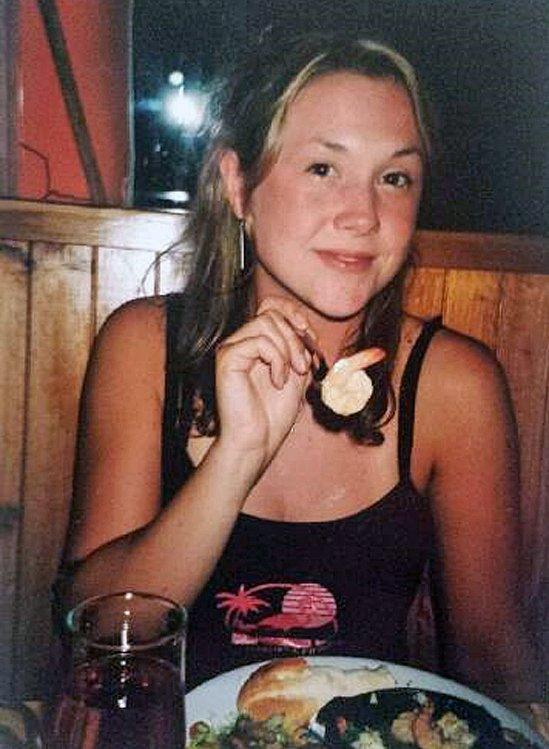
She's now doing a PhD on the subject at the Open University, external.
"I'm doing this to highlight that there are thousands of children of priests around the world and no-one knows about them," she says. "They are powerless and they're at the mercy of this institution and that's just not right."
Through her mentoring work with Coping International and her PhD research Sarah now knows about 100 people who have been fathered by priests, from countries all over the world, but believes there are thousands more out there. She says it's striking that there are so many common features to their experiences.
"Secrecy always comes up - lots of people talk about being encouraged to lie to keep their fathers a secret," Sarah says. "Lack of identity is common too, and the confidentiality agreements - whether official or verbal - are quite common too, and the payments."
Having been brought up a Catholic, Sarah has struggled to understand why it's acceptable for her father, a man who preaches about the importance of family and loving your neighbour, to behave in a completely opposite way in his private life.
"If a group of teachers decided to reject their children because they said they had a calling from God, or just because they wanted to do more work, that wouldn't be OK - so it's not OK that this is being allowed," she says.
A spokesperson for the Catholic Bishops' Conference of England and Wales says: "In such circumstances, which are so personal and particular, every bishop in England and Wales would want to discern the best ways in which it is possible for the father of a child, who is a priest, to fulfil his responsibilities... Every bishop in England and Wales is willing to meet anyone in their diocese whose father is a priest."
Sarah believes the Catholic church - which forbids priests to marry or have sex - should make clerical celibacy optional.
"Children will continue to suffer and priests will continue to hide their children until it's made optional," Sarah says. "If it was optional it would probably help lots of future priests' children to have much happier relationships with their fathers, and for the men to have less guilt and shame about having relationships with their own children."
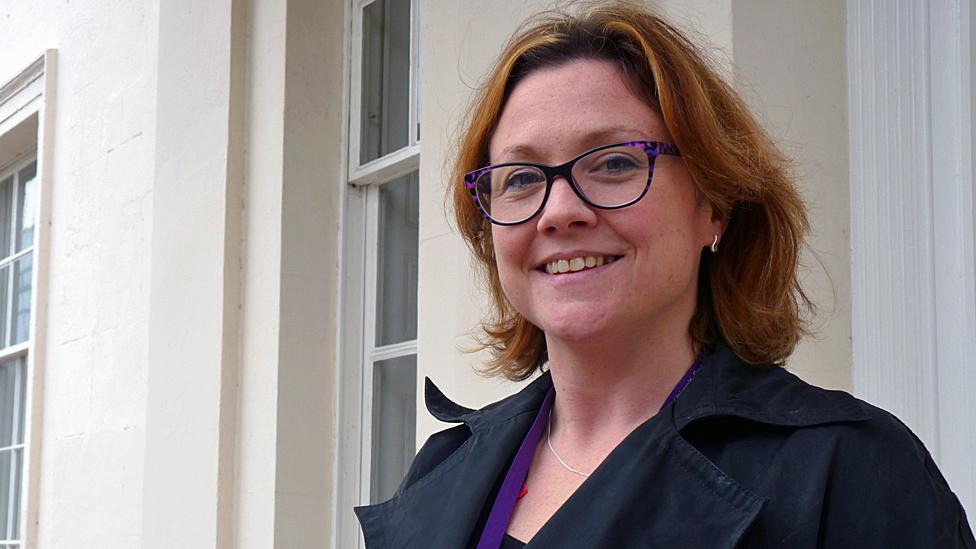
Sarah's father is in his 70s now. They no longer meet. Sarah writes to him occasionally and he sends money for her children's birthdays but she doesn't hold out any hope that the situation between them will improve.
"When someone consistently puts their own needs before yours - their child - you're always wondering if you're going to get hurt again."
But coming close to death gave Sarah a new perspective on her relationship with her father.
"Being conscious and very much alert and awake away from my body after my accident confirmed to me that we do go on," Sarah says.
"I'm not religious, but maybe one day, after we both die, maybe then we'll be closer. Who knows?"

Join the conversation - find us on Facebook, external, Instagram, external, Snapchat , externaland Twitter, external.